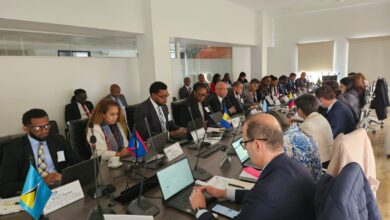(CARICOM Secretariat, Turkeyen, Greater Georgetown, Guyana)Human safety and well-being ‘will worsen as a direct consequence of climate change’ and children are most vulnerable, said UWI lecturer, Dr Leonard Nurse.
Addressing a technical session at the Twelfth Special COHSOD on children which opened in Guyana today, Dr Nurse cautioned his audience comprising Ministers of Government of the Caribbean Community (CARICOM), child advocates and other regional and international stakeholders that by the year 2020, ten to 14 million people around the world would be at risk to disasters.
Quoting from the Intergovernmental Panel on Climate Change (IPCC) Fourth Assessment Report 2007 for which he is the lead author, Dr Nurse noted that current trends indicated that the Caribbean would be experiencing in the next decade an increase in the intensity of hurricanes; severe water crises; frequent outbreaks of several air and water borne diseases, such as an increase in the transmission of dengue fever, as a consequence of the accelerating effects of climate change.
Emphasising that children become extremely vulnerable in emergency situations, Dr Nurse made a strong call for the development of child-centred interventions which should include child friendly shelters and early education of children about the realities of climate change as part of the re-programming process.
According to Dr Nurse, “children need to be taught and not simply be told how to help take care of aspects of their own nutrition and sanitation,” and this education, he said, must start at the early childhood level and continue through to the tertiary level of the education sector in the Caribbean.
He added that in designing such programmes for children, there was a need to consider our vulnerability not just from a national level but as a Community.
“While programming for children in the context of climate change and emergencies will require focused site-specific local initiatives, the overall context should be informed by a regional perspective,” the UWI professor asserted.
Dr Nurse pointed out that while we must seek to prevent and minimize mortality in emergency situations, great emphasis should be placed on the long term effects of the aftermath of the disaster.
“While programming must seek to prevent and minimize mortality rate arising from disasters and climate change, it should be emphasized that morbidity and its associated fall-out can impose longer-lasting negative impact on children through displacement, physical injury, disruption in their education and re-adjustment to new environments, “ Dr Nurse reiterated .
The Twelfth Special COHSOD which has its focus on children opened today (17 March 2008) at the Guyana International Convention, under the theme, Building a Region Fit for Children. It has brought together a wide range of regional and international stakeholders and decision-makers, including CARICOM ministers of government, civil servants, child advocates and private sector interests who will focus on progress towards the attainment of the Convention on the Rights of the Child, and the subsequent establishment of a revised regional Framework of Action for Children.





